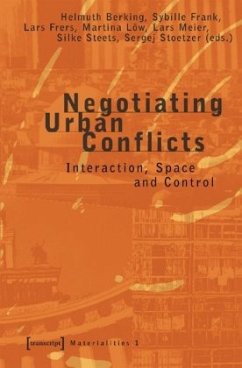Cities have always been arenas of social and symbolic conflict. As places of encounter between different classes, ethnic groups, and lifestyles, cities play the role of powerful integrators; yet on the other hand urban contexts are the ideal setting for marginalization and violence. The struggle over control of urban spaces is an ambivalent mode of sociation: while producing themselves, groups produce exclusive spaces and then, in turn, use the boundaries they have created to define themselves. This volume presents major urban conflicts and analyzes modes of negotiation against the theoretical background of postcolonialism.
Bitte wählen Sie Ihr Anliegen aus.
Rechnungen
Retourenschein anfordern
Bestellstatus
Storno








